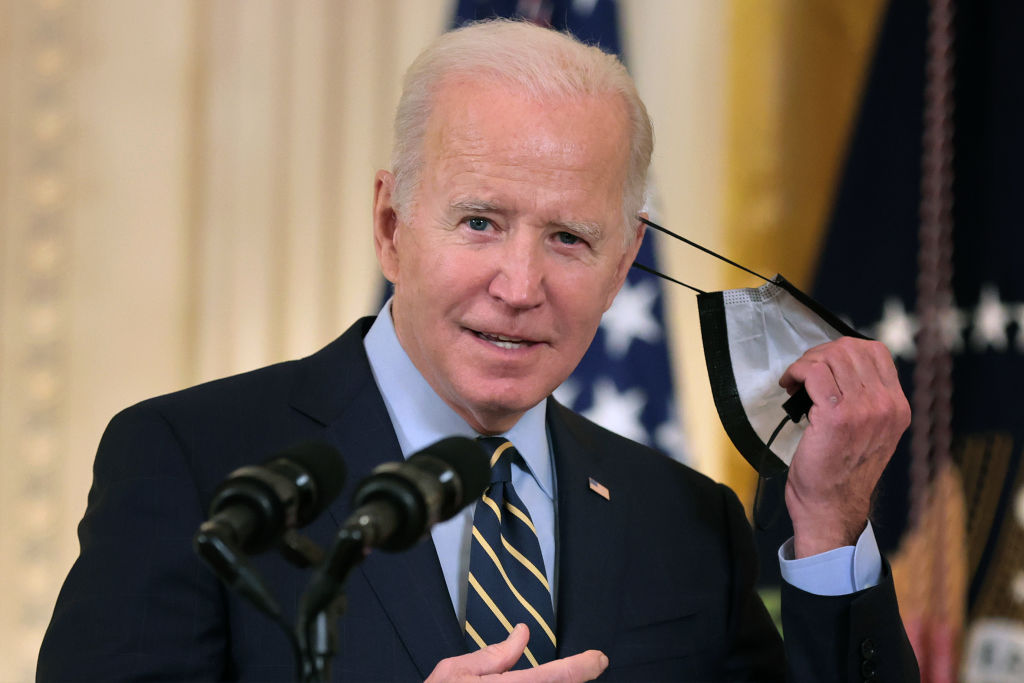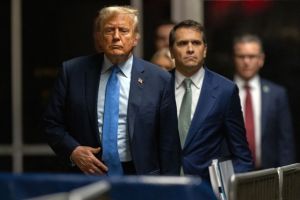Will Biden meet this perilous moment?
William Burns was honest about what he didn’t know but clear about what was possible. In an interview Monday, the CIA director said that US intelligence agencies have not concluded that Russia will invade Ukraine but that the army assembled by Vladimir Putin close to the border “could act in a very sweeping way.”
Burns widened the lens to argue that we are at a “rare moment of transformation.” It’s hard to disagree. From Ukraine to Taiwan, from Iran’s nuclear proliferation to a burgeoning shadow war in space, the nature of threats to America are changing. And one cannot but feel that all of this is approaching an uncomfortable pinch point. You feel that Joe Biden’s slogan-heavy foreign policy is about to be tested, that the president will be forced into a choice between major action and a humiliating admission of powerlessness.
I don’t mean this to sound like saber-rattling. Realist or interventionist, hawk or dove. Labels are one thing. Statecraft is another. Whatever one’s school of thought (and such groupings can be misleading), difficult moments leave little margin for error.
And America finds itself at such a moment with a president who just 40 percent of voters think is in good health and whose second term is in doubt less than a year into his first. The country feels inward-looking and too obsessed with its own shortcomings to have any real perspective about the rest of the world as it is, not as an avatar for some internal political row.
Most worrying of all is the way in which the perception of vulnerability can become self-fulfilling. This, belligerent powers may conclude, is the time to act.
Beyond the basic and concerning question of competence, it remains to be seen whether Biden’s foreign policy will effectively adapt to a rapidly transformed world, or whether it will cling to bromides about the rules-based international system. The president’s much touted Summit of Democracies, which takes place later this week, will be the next opportunity to gauge which way Team Biden is leaning.
On the most important question of all, the jury is still out. For all that has changed in American attitudes — and policy — on China, the White House seems reluctant to acknowledge the basic contentiousness of the relationship. One day, a laudable diplomatic boycott of the Beijing Winter Olympics. The next, slow-peddling on a bill to ban goods produced by slave labor in Xinjiang in the hope of striking a climate deal with the world’s biggest polluter.
Missing among these policy indicators is an actual plan. “We appear to be embarking on a long, dangerous journey without knowing where we are trying to go or how we will get there,” wrote Hal Brands in a Wall Street Journal essay this weekend. He argues for Cold War-style containment to guide US decision-making. For Bloomberg last week, Niall Ferguson explained the cocktail of factors that is bringing the age of globalization to an end. Like Brands, he foresees a long stand-off with China: “I see little chance of Cold War II reaching the détente phase earlier than Cold War I,” he wrote.
Every now and then, one can almost feel history happening. The footage of an Afghan tumbling from the sky as he lost his grip on a US airplane departing Kabul in August was one such moment.
In 2018, Henry Kissinger said he thought Donald Trump “may be one of those figures in history who appears from time to time to mark the end of an era and to force it to give up its old pretenses. It doesn’t necessarily mean that he knows this, or that he is considering any great alternative.” Biden’s Kabul withdrawal made clear to those who still doubted it that a page had been turned.
You cannot help but feel we are at an epochal moment. And you cannot shake the doubts about US leaders’ ability to meet that moment.
*** Sign up to receive the DC Diary in your inbox every weekday ***
Rubio’s gamble pays off
Last week, Marco Rubio was accused of grandstanding and unserious game-playing when he held up the National Defense Authorization Act, a must-past military funding bill, over the exclusion from the package of an anti-slave labor amendment. The Florida senator took a stand because of frustration that legislation to ban imports from Xinjiang had been held up by the House.
Far from pointless politicking, Rubio’s move appears to have delivered some results. Yesterday House Speaker Nancy Pelosi announced that the House would take up the Uighur Forced Labor Prevention Act this week.
Psaki’s testing tribulations
If you wanted an illustration of the Biden administration’s strange lack of ambition in its Covid response, then look no further than an exchange in the White House press room yesterday. Asked whether the federal government could make routine Covid testing easier by, say, making them free rather than requiring Americans to claim the cost from their insurers, White House press secretary Jen Psaki responded with a mocking rhetorical question. “Should we just send one to every American,” she asked. As others have noted, that is the policy in several other countries, including the UK.
Democrats’ willingness to embrace onerous restrictions on everyday life in response to the pandemic (New York mayor Bill de Blasio’s stringent new vaccine mandate is the latest example), but failure to think big when it comes to helping Americans live with the virus is, by now, a well-established dynamic. But that doesn’t make it any less maddening.
What you should be reading today
Bill Zeiser: Yellowstone appeals to a nation of soft hands
Peter Wood: Down with Strunk and White
Alex Perez: Hispanics will not submit to ‘Latinx’
Jack Shafer, Politico magazine: Time to pull the plug on cable news
Jonathan Haidt and Greg Lukianoff, Persuasion: How to keep your corporation out of the culture war
Charles Fain Lehman, City Journal: New York City’s drug experiment
Poll watch
President Biden job approval
Approve: 42.6 percent
Disapprove: 51.2 percent
Net approval: -8.6 (RCP Average)
A hypothetical 2024 match-up
Joe Biden: 45 percent
Donald Trump: 48 percent (Harvard CPAS-Harris)


















